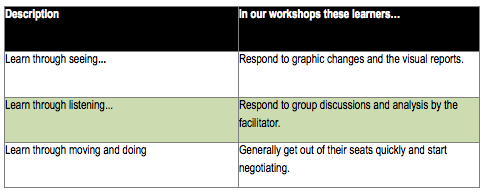by Paul Ladley
If Elvis had been singing about games based learning, he might have demanded,”a little less action, a little more conversation”
Even individually played games can generate conversations. “Have you seen this?” “How did you do that?” Any teacher who has used games in lessons knows that these classes were far from quiet! “Individual” games are often played by pairs of pupils who prefer to work this way.
Collaborative games based learning (GBL), such as Sustainaville a whole class simulation, take conversations to a different level. Gameplay is structured around rounds and phases to encourage conversation. The learners talk in their teams, between teams, at a class level and with the teacher. The game anchors these conversations allowing a natural set of questions to flow during the course of the plan > do >review phases. A demonstration of Sustainaville can be found at:
http://www.games-ed.co.uk/sustainaville-demo.html
These conversations are at the heart of the learning; they are inclusive and are not formalised / one-way. It is through these questions that learning flows. Together the class constructs their understanding, and makes tacit knowledge (emotions, experiences, insights, intuition, observations and internalised information) explicit. Games can be more than a one-off lesson. Simulations such as Sustainaville can anchor a topic: students can research aspects of the simulation plus write and present reports based on their experiences.
By blending in with a standard pedagogical approach, GBL offer an innovative way to deliver in three key areas: improving attainment, generic skills and employability skills.
1. Improve attainment / narrowing the gap:
- Develop emotional intelligence and improve behaviour leading to better
- Supports different learning styles – see table below.
- Cross curriculum delivery and shared learning experience across subject groups.
- Reluctant learners and boys – learning games cater for different learning needs and are intrinsically motivating.
- Students can learn from mistakes during game play without worrying about
- Project-based learning motivates, engages and provides a tangible use of learning
- An ‘in the curriculum, but out of class’ approach will enable learning hours to be increased by providing homework missions.
- Supporting the flipped classroom. Games are played at home and the analysis & learning reflections are done in lessons.
2. Personal, Learning and Thinking Skills / Soft Skills:
Improve skills such as communication, negotiation, decision-making and emotional intelligence – 21st century skills
Self-esteem – learning games provide inclusive activities accessible to all.
3. Employability Skills
Experiential learning / learn by doing: opportunity to enhance learning by applying it to a “real” world setting.
Project-based: developing games, scenarios and e-Learning with young people, provides a focus for learning and develops a business / project mentality.
Conclusion
GBL goes beyond being fun, not that there is anything wrong with that, to offer an innovative approach to tackling key issues in education and beyond. Careful planning and execution of GBL will ensure that learning outcomes are delivered and that GBL doesn’t become fad.


















